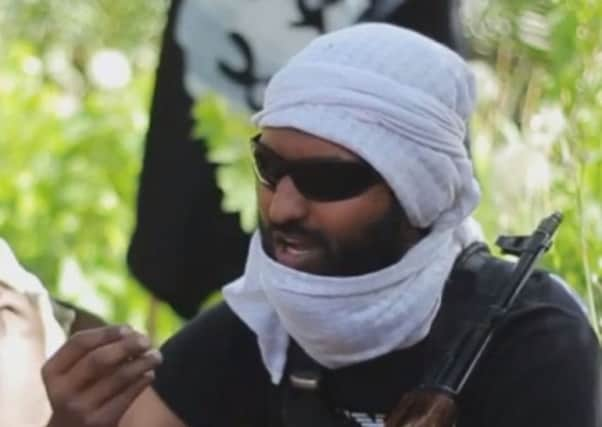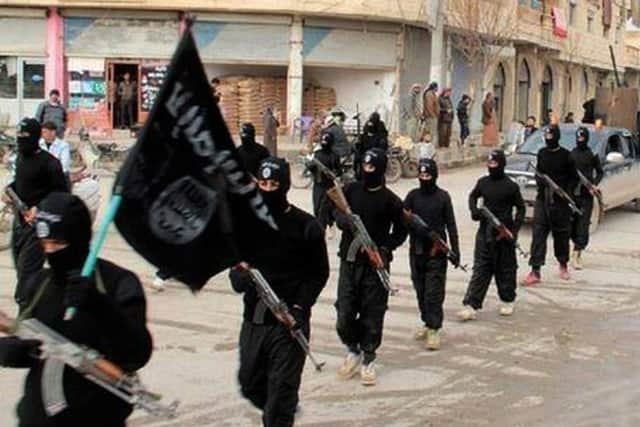Scots jihadist killed by RAF drone strike in Syria


Ruhul Amin, 26, was killed in a precision attack on 21 August which was targeting another British man, Reyaad Khan, from Cardiff, who was blamed for orchestrating attempted terrorist attacks in the UK and recruiting more British extremists.
The Prime Minister described the attack’s circumstances as “relatively unique” and insisted that it was not part of the UK joining coalition attacks against IS in Syria.
Advertisement
Hide AdAdvertisement
Hide AdHowever, Mr Cameron admitted that the attack was the first of its kind in a state where the UK is not fighting a war.


And it has raised questions from opposition parties and Tory backbenchers whether the government is using the strike as a means to expand its military operations against IS from Iraq into Syria.
Concerns were fuelled by the director-general of defence think-tank Rusi, Professor Michael Clarke, who said the killing of Khan marked “a big departure” for UK policy.
“This drone strike is the first to have been conducted, apparently, as a targeted assassination,” said Prof Clarke.
“The point is not so much that this man was British but that he was targeted in an area that the UK does not currently regard, legally, as an operational theatre of war for UK forces.”
However, Mr Cameron again pledged the UK Government would ask permission from MPs before joining regular airstrikes in Syria and claimed the attack was legal as it was based on “the right to self-defence”.
He also revealed that a third British IS terrorist, Junaid Hussain, from Birmingham, was killed in a US airstrike.
Mr Cameron said that six attempted IS atrocities in the UK have been foiled this year alone.
Advertisement
Hide AdAdvertisement
Hide AdThe Prime Minister said: “Both Junaid Hussain and Reyaad Khan were British nationals based in Syria who were involved in actively recruiting Isil [IS] sympathisers and seeking to orchestrate specific and barbaric attacks against the West, including a number of planned terrorist attacks right here in Britain, such as plots to attack high-profile public commemorations.
“We should be under no illusion. Their intention was the murder of British citizens. So on this occasion we took action.”
He went on: “We took this action because there was no alternative. In this area, there is no government we can work with.
“We have no military on the ground to detain those preparing plots. And there was nothing to suggest that Reyaad Khan would ever leave Syria or desist from his desire to murder us at home. So we had no way of preventing his planned attacks on our country without taking direct action.”
He said: “I am clear that the action we took was entirely lawful. The Attorney General was consulted and was clear there would be a clear legal basis for action in international law.
“We were exercising the UK’s inherent right to self-defence.”
But his explanation failed to satisfy critics who are concerned about attempted mission creep in the Middle East after MPs rejected proposals to bomb the Assad regime in Syria almost exactly two years ago.
SNP defence spokesman Brendan O’Hara said: “David Cameron has got to come clean about his plans following these developments. I have long been concerned about what exactly his plans are to increase military activity – and now we are getting an insight.
Advertisement
Hide AdAdvertisement
Hide Ad“I fear that David Cameron is planning to use this awful humanitarian tragedy as a smokescreen in order to fulfil his long-held desire to involve UK forces in more military action in Syria.”
He added: “The case for bombing in Syria has simply not been made – and any involvement of British service personnel in bombing without the approval of Parliament clearly flouts the democratic decision taken by the House of Commons.”
Kirsty Blackman, the SNP MP for Amin’s home constituency, added: “David Cameron’s announcement leaves a large number of questions over the way in which the UK Government has acted.”
Labour’s acting leader Harriet Harman urged publication of the legal advice justifying the decision.
She continued: “What was it about this individual and his actions that singled him out from all that has gone before? Did he represent an ongoing threat or was the threat based on a specific act he was plotting?”
Ms Harman said there was a need for “independent scrutiny” of the attack and said David Anderson, the independent reviewer of counter-terrorism policy, should examine the events.
But she told MPs the current Labour leadership – due to hand over to a newly elected leader on Saturday – would look at any case for expanding ongoing British bombing in Iraq into Syria.
Ms Harman said: “We will carefully consider any proposals in relation to military action in Syria.”
Advertisement
Hide AdAdvertisement
Hide AdBut Labour leadership favourite Jeremy Corbyn, who opposes action, urged Mr Cameron to invite Iran to a summit of Middle Eastern countries alongside Britain, the US and Russia, to try and thrash out a political solution to the war in Syria.
He said: “Would you say anything about the welcome remarks made by the Foreign Secretary during his visit to Tehran in which he indicated that because of the new relationship with Iran there was a possibility of a wider political involvement in bringing about some degree of progress?”
It was also clear that Mr Cameron’s strategy would meet opposition from Tory backbenchers with former defence minister Sir Gerald Howarth and defence select committee chairman Dr Julian Lewis suggesting Britain drops its goal of toppling Syrian president Bashar Assad, in order to gain Russian support for creating safe havens in the war-torn country.
Mr Lewis said: “Does the government recognise that by remaining fixated on removing Assad, that puts a bar on any solution of this sort and will the government make up its mind that the main threat to our interest is Daesh [IS] and if so, we can proceed to have a genuinely international coalition and agreement against that main threat?”
Mr Cameron described the suggestion as a “great mistake”.
The Liberal Democrats also pressed for an international political solution.
The attack on the British jihadists was condemned by the Campaign for Nuclear Disarmament (CND) and Reprieve.
Kate Hudson, general-secretary of the CND, said: “That a British citizen was targeted and killed by these strikes – and another killed by mistake – is particularly alarming and sets a dangerous new precedent.”
Kat Craig, of Reprieve, said: “Make no mistake – what we are seeing is the failed US model of secret strikes being copied wholesale by the British Government.
“Ministers repeatedly promised Parliament and the public that there would be no military operations in Syria without parliamentary approval.”